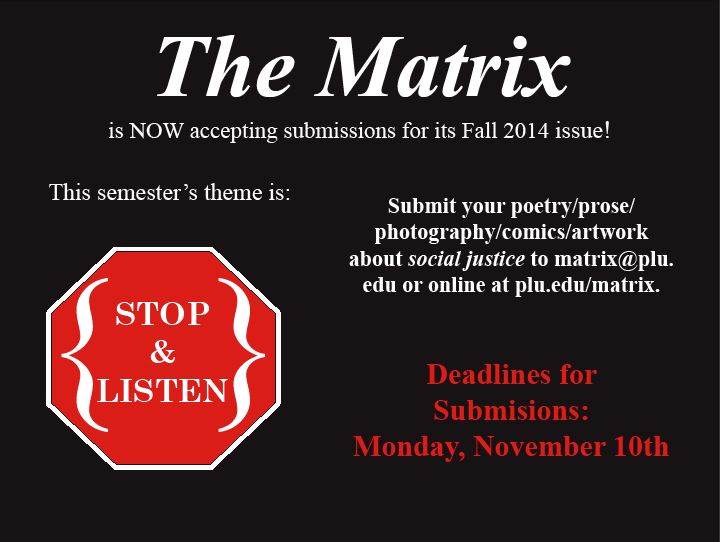Part I
By Laura Johnson, Co-Editor of The Matrix
What do stop signs and Pacific Lutheran University’s social justice journal, The Matrix, have in common this semester? For both, you are required to come to a complete stop.
When I first came up with this question, I could not help but cringe; it almost sounds like the punch line of a badly constructed joke.
Yet, as we were brainstorming ideas for how to promote and explain this semester’s theme of The Matrix, “STOP & LISTEN,” I could not help but continue to refer back to the iconic red and white of a stop sign.
Whenever one encounters a stop sign, its meaning seems easy enough: stop. However, the more you drive and walk through intersections, you come to realize that there can be a plethora of interpretations of what stop means.
There will be drivers who pause for the recommended “one-Mississippi,” drivers who lightly tap on their breaks in a “rolling stop” and those who merely see this sign as a suggestion and not a law as they drive right through.
It is similar when talking about stopping in a social justice context. When you ask people to stop and listen to social justice issues, there are people who give you their undivided attention and truly listen to what you have to say, those who might take out a single headphone to hear about your latest issue for advocacy and those who will pass right by your petition altogether.
However, like a stop sign, there truly is a right way to stop.
And really, there is a necessity to stop.
Living in a world with complex local, national, and global issues, we cannot as a society—and as a campus—be breezing on by when we are asked to stop and think about social justice. Advocacy and writing about our stories is empowering, but it loses meaning without a receptive and respectful audience.
Therefore, while we are working this semester at The Matrix to encourage students to write about issues they want their fellow Lutes to pay attention to, we are also encouraging students to think more critically about what it means to listen.
Part II
By Angie Tinker, Co-Editor of The Matrix
Talking is only half of a conversation; the other half is listening. When thinking about issues of social justice, it’s important to take time to follow The Matrix’s theme this year and Stop & Listen.
I’m on the debate team, which has given me way too much time to argue with other people. When I’m outside of debate rounds, though, I don’t usually like to get into too much direct rebuttal.
The reason is that any good debater knows that it’s far more important to really know what someone is saying. Otherwise, people just end up talking past each other.
Why is that a social justice issue? There are crucial issues in society where people are on opposing sides.
Listening takes respect. When talking about someone you disagree with, it’s too simple to just repeat what others say. It’s too easy to say, “I disagree with that politician because my friends all say that the politician hates America.”
It becomes an echo chamber.
Listening is something radically different, though. It takes a serious moment to stop, to let go of all of the preconceptions and assumptions, to truly listen to what someone has to say.
It isn’t easy. In fact, it can be incredibly frustrating to listen to someone. The urge to interject, to disprove, to argue, is strong. Even if we can stay silent, that doesn’t mean that we are really listening. We can tune out, we can stay disinterested, or worse, we can avoid even showing up.
Listening to someone means giving them your full time and attention. It extends beyond the time and place. It means keeping it in mind. That’s something I think we all deserve.
The deadline for submissions for The Matrix is Nov. 10. You can submit poetry, prose and photos to http://matrixaplu.edu or on our website.




















